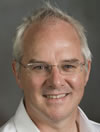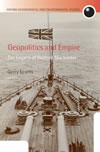Introducing Gerry Kearns
 Gerry Kearns is Director of the School of Public and International Affairs at Virginia Tech. After being an undergraduate and postgraduate at the University of Cambridge (UK), he has worked in Departments of Geography at the Universities of Liverpool (UK), Wisconsin-Madison (USA), and Cambridge (UK). Mr Kearns researches topics in historical, political, and medical geography.
Gerry Kearns is Director of the School of Public and International Affairs at Virginia Tech. After being an undergraduate and postgraduate at the University of Cambridge (UK), he has worked in Departments of Geography at the Universities of Liverpool (UK), Wisconsin-Madison (USA), and Cambridge (UK). Mr Kearns researches topics in historical, political, and medical geography.
His new book, “Geopolitics and Empire: The Legacy of Halford Mackinder” has just been published by Oxford University Press: Book description by Oxford University Press
Geopolitical Passport
Your relationship with geopolitics
At what age did you discover geopolitics and what attracted you to it?
 As a first year graduate student, I began looking at the ideas of Halford Mackinder and their relations with the political thought of his day.
As a first year graduate student, I began looking at the ideas of Halford Mackinder and their relations with the political thought of his day.
Which geopolitical topics have you focussed on and why did you choose especially these?
Following my interest in Mackinder, I have been particularly interested in the links between geopolitics and imperialism.
What do you consider your most important contribution to geopolitics?
My work on Mackinder is now published as “Geopolitics and Empire: The Legacy of Halford Mackinder” (Oxford University Press, 2009).
In it I offer a comparative approach to the contextual history of Geopolitics and a way of making that history both critical and effective for modern Geopolitics. The comparative approach means that I show how contemporaries of Mackinder’s who yet shared a similar intellectual context elaborated very different world-views, placing moral and political choices at the heart of Geopolitics.
I show that the legacy of Mackinder may be understood in terms both of echoes and influences. Influences are the genealogical track of people learning from Mackinder’s writings or from thinkers who themselves had read Mackinder. Echoes are when modern thinkers appear almost to reinvent Mackinder’s ideas by addressing the same problems as Mackinder with very similar assumptions to his.
I try to show that this approach can produce what Mitchell Dean writing of Michel Foucault calls critical and effective histories. I do this by showing that alongside Mackinder’s echoes and influences we can identify an alternative legacy that challenges Mackinder and that cannot be dismissed, as it would have been by Mackinder himself, as merely idealistic since that parallel legacy of Progressive Geopolitics can point to many global institutions and arrangements that work towards a world characterized by peace, cooperation and justice rather than by war, competition and force.
My geopolitical preferences
What is your favourite definition of geopolitics?
Geography in the aid of statecraft. It captures the idea that statecraft might be an art and science that could comprehend a range of approaches and that geography likewise can serve very different styles of statecraft.
Which geopolitical scientist do you admire the most?
Donald Meinig. His four volume work on The Shaping of America is a coherent and systematic study of the relations between space and statecraft in the elaboration of the human geography of the United States.
What is your favourite geopolitical book?
Derek Gregory’s “Colonial Present: Afghanistan, Palestine, Iraq” (Blackwell, 2004). The book engages with the relations between space and statecraft in the so-called Middle East and brings out the vital ethical issues involved in the remaking of spaces in line with so-called security interests.
What is your favourite geopolitical website?
The website of United for Peace, which collates a whole series of resources for hope in the pursuit of global justice
The geopolitical future
In what direction(s) will geopolitical science be heading the coming decades?
Addressing the legacy of Bush II.
Which geopolitical subject has been too little in the spotlight and needs further research?
The resources for hope.
What will be the largest geopolitical challenge for the world in the 21st century?
Injustice.

